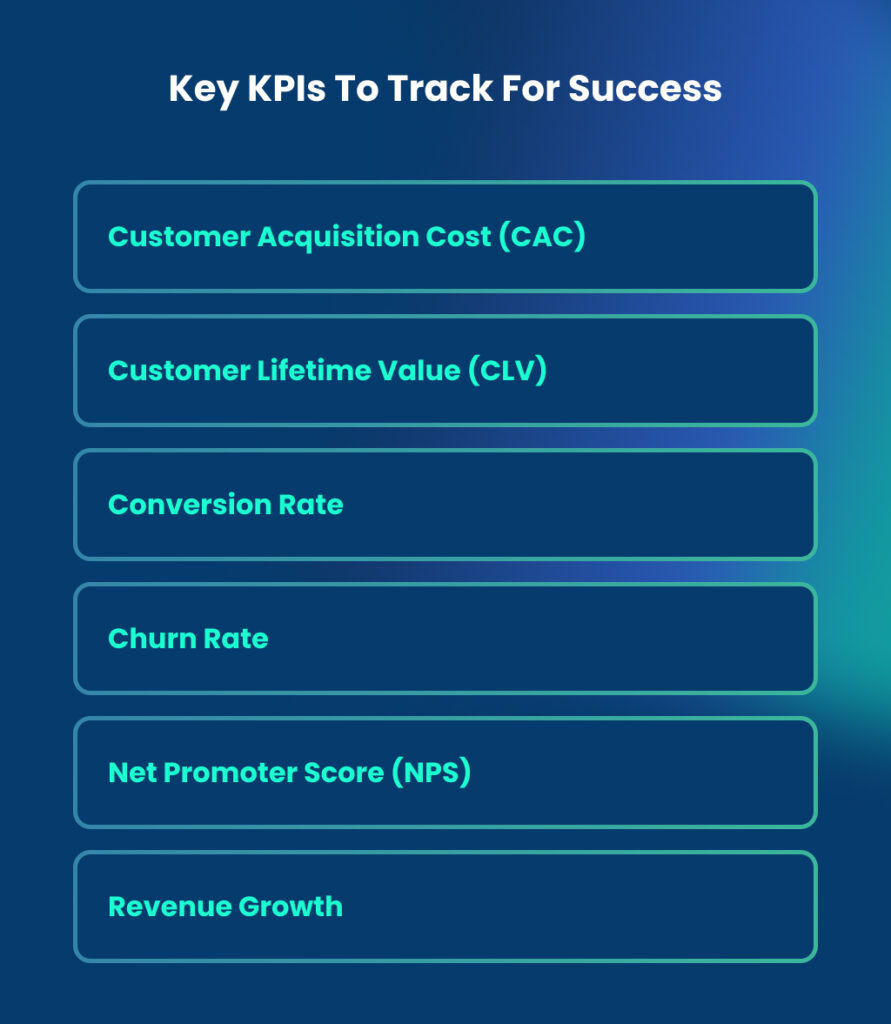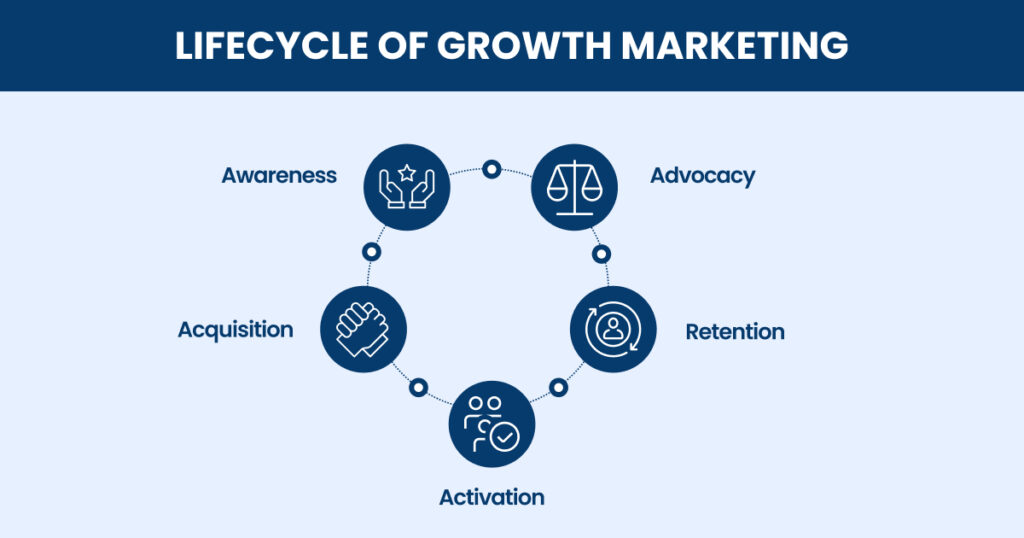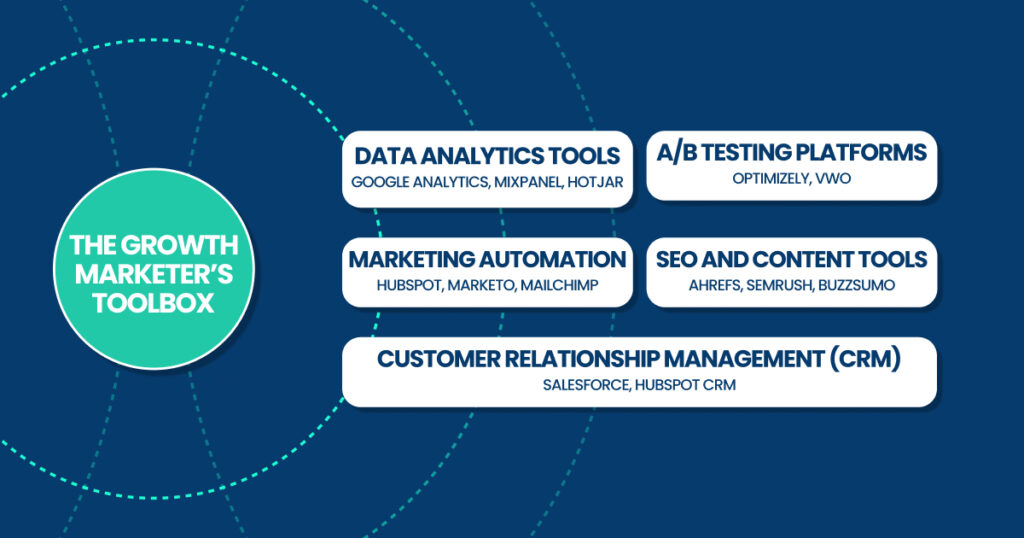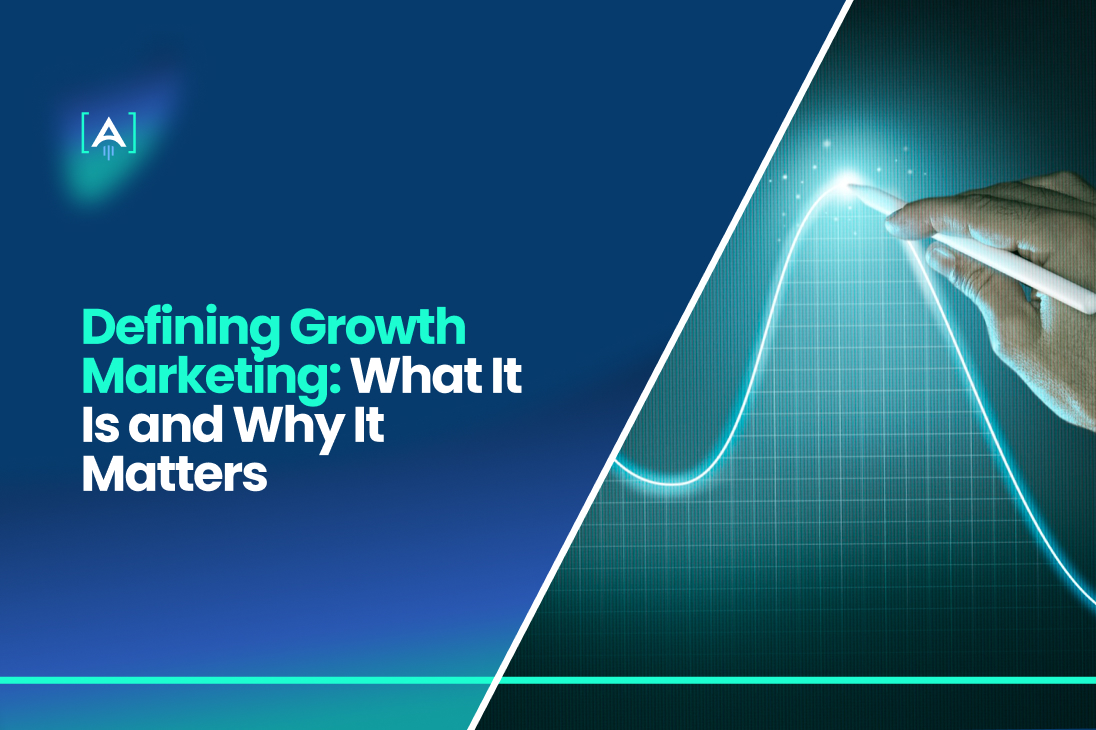Imagine a world where discussions are shaped by your needs and industry leaders consider the very challenges you face.
That’s the power of well-designed growth marketing, which is the mastermind behind it all.
Unlike traditional marketing, which often focuses on broad-reaching campaigns and static strategies, growth marketing is dynamic and continuously adapts to meet evolving business needs.
Keeping your business ahead of the curve is crucial. Growth marketing vs. traditional marketing showcases this by emphasizing data-driven strategies and continuous experimentation over fixed, one-size-fits-all approaches.
Keeping your business ahead of the curve is crucial.
A growth marketing agency acts as your secret weapon, bringing expertise and data-driven strategies to fuel sustainable growth and maximize your return on investment.
What is Growth Marketing?
At its core, understanding what is growth marketing or growth marketing definition, refers to the systematic and relentless pursuit of expansion through experimentation and analysis. This strategic approach is about more than just driving traffic or generating leads.
The growth marketing definition emphasizes the importance of optimizing every stage of the customer lifecycle, including acquisition, activation, retention, and monetization.
So, what is growth marketing? It’s an approach that integrates data-driven insights with a comprehensive understanding of your business to identify and seize opportunities for lasting expansion.
By comparing growth marketing vs digital marketing, you can better align your strategy with your goals and ensure your efforts lead to substantial and enduring success.
Growth marketers use data-driven techniques, growth marketing tools, and innovative marketing strategies to ensure continuous and sustainable growth, adapting their methods to meet evolving market demand generation and customer needs.

Source: Forbes
Growth marketers can use A/B testing and AI marketing techniques to make data-backed decisions that enhance the overall customer experience and increase lifetime value.
Core Principles of Growth Marketing
Now that you know the answer to “What is growth marketing,” let’s see how growth marketing services can uniquely benefit your business.
Several key principles underlie the practice of growth marketing, setting it apart from more conventional approaches. Understanding these principles helps clarify the growth marketing definition and how it drives business success.
- Data-Driven Decision Making: The growth marketing definition fundamentally revolves around the extensive collection and analysis of data to guide strategic decisions.
Every action taken is measured and assessed for its impact on growth metrics, allowing marketers to pivot quickly if something isn’t working. This data-centric approach ensures that resources are allocated efficiently and outcomes are continuously optimized.
- Customer-Centric Focus: Growth marketing strategies strongly emphasize understanding and meeting customer needs. This involves mapping out the entire customer journey and identifying touchpoints where the customer experience can be improved.
By prioritizing customer satisfaction and engagement, growth marketers can build stronger relationships and encourage loyalty, further reinforcing the essence of the growth marketing definition.
- Scalability and Flexibility: A successful growth marketing strategy is designed to scale as the business grows. This means implementing systems and processes that can handle increasing volumes of data and customer interactions.
Flexibility is equally important, as growth marketing must adapt to changing market conditions and customer preferences, a core aspect of the growth marketing definition.
Key Components of Growth Marketing

Key to understanding “what is growth marketing” is recognizing the essential components that span the entire customer lifecycle:
- Acquisition: The first step in growth marketing is attracting potential customers. This often involves a combination of inbound and outbound strategies such as content marketing, SEO, and paid advertising.
Growth marketers use targeted approaches to reach the right audience and employ techniques like retargeting to keep prospects engaged. - Activation: Once potential customers are acquired, the next focus is on activation—ensuring they have a positive initial experience with the product or service. This can be facilitated through user onboarding processes, personalized welcome messages, and guided tours. The goal is to convert new users into active and engaged customers quickly.
- Retention: Keeping customers coming back is crucial for long-term growth. A retention strategy includes regular communication, loyalty programs, and personalized content encouraging repeat engagement.
Growth marketers analyze customer behavior and feedback to understand why customers stay or leave and use this insight to enhance retention efforts. - Revenue: Beyond retention, growth marketing aims to maximize the revenue generated from each customer. This includes upselling and cross-selling opportunities, optimizing pricing strategies, and identifying new revenue streams.
AI marketing tools can be particularly effective here, offering personalized recommendations and pricing based on customer data. - Referral: Encouraging existing customers to refer new ones is a powerful growth driver. Referral marketing strategies incentivize customers to spread the word about a product or service. This can be achieved through referral programs, social sharing incentives, and leveraging customer testimonials.
The nuances of growth marketing vs performance marketing are crucial to consider.
Growth marketing focuses on long-term, sustainable strategies that drive holistic business growth, while performance marketing targets immediate, specific outcomes like lead generation and sales.
Advanced Techniques in Growth Marketing
In addition to these components, growth marketing incorporates advanced techniques to optimize and accelerate growth. A/B testing is a staple in the growth marketer’s toolkit, allowing them to test campaign or feature variations to see which performs better.
This method ensures that only the most effective strategies are scaled up.
Growth marketing incorporates advanced techniques to optimize and accelerate growth. Understanding these techniques deepens the growth marketing definition and showcases its dynamic nature.
AI marketing is another critical area where growth marketing shines. AI tools can analyze vast amounts of data to identify patterns and predict customer behavior, enabling more personalized and efficient marketing efforts. This technology can automate routine tasks, freeing up growth marketers to focus on strategy and innovation.
Why Growth Marketing Matters
Growth marketing has become an indispensable strategy for businesses looking to thrive in today’s competitive and fast-paced market. This is because the growth marketing definition encompasses continuous and adaptive strategies, which are essential for sustainable success.
While brand marketing is also crucial for building identity and fostering customer loyalty, it often focuses on long-term reputation and broad awareness.
However, when comparing brand marketing vs growth marketing, it’s clear that growth marketing prioritizes immediate, data-driven tactics to attract, retain, and expand the customer base.
The continuous cycle of experimentation and optimization is a key aspect of the growth marketing definition, enabling businesses to stay agile and responsive to market changes.

Competitive Advantage in Saturated Markets
In an era where digital marketing has leveled the playing field for businesses of all sizes, standing out requires more than a compelling product or service.
This approach aligns closely with the growth marketing definition, which emphasizes the use of detailed analytics and technological tools to uncover valuable insights about customer behavior.
Growth marketing focuses on using data and technology to gain a deeper understanding of customer needs and preferences. This insight allows businesses to tailor their offerings and interactions to resonate more effectively with their target audience.
Leveraging Data and Technology
Growth marketing teams are adept at harnessing data analytics and AI to uncover patterns and insights that traditional marketing approaches often miss.
They employ sophisticated tools to monitor customer behavior, track marketing campaign performance, and identify optimization opportunities. For instance, growth marketers might use behavioral analytics to segment customers based on their interaction with a product, enabling more personalized and relevant marketing efforts.
Case Study: Netflix
Netflix exemplifies how growth marketing can provide a competitive edge. By collecting and analyzing massive amounts of user data, Netflix personalizes recommendations to keep subscribers engaged.
Their algorithms track viewing habits and preferences, allowing them to suggest content that aligns with each user’s tastes. This personalized approach has significantly contributed to Netflix’s high customer retention rates and market dominance.
Cost-Effective Customer Acquisition
One of the standout benefits of growth marketing is its focus on cost-effective customer acquisition. Traditional marketing strategies often involve significant upfront costs for broad-reach campaigns, such as TV commercials or billboards, with no ROI guarantee.
In contrast, growth marketing utilizes precise targeting and continuous optimization to maximize the impact of every dollar spent.
Example: Social Media Advertising
Social media platforms offer powerful tools for growth marketers to target specific audience segments with tailored messages.
Through techniques like retargeting—showing ads to people who have previously interacted with the brand—businesses can more efficiently maintain engagement with potential customers.
Furthermore, growth marketing strategies often include continuous testing and adjustment of ads, known as A/B testing, to refine their effectiveness and reduce cost per acquisition over time.
Enhanced Customer Experience
Growth marketing isn’t just about acquiring customers; it’s about creating a seamless and satisfying experience that fosters long-term loyalty and advocacy.
By focusing on the entire customer journey, growth marketing ensures that every interaction is ICE scoring and optimized to meet and exceed customer expectations.
Tools and Techniques for a Better Customer Experience
- Customer Feedback Loops: Successful growth marketing teams implement systems to collect and act on customer feedback continuously. This feedback is invaluable for understanding customer pain points and identifying areas for improvement.
Tools like NPS (Net Promoter Score) surveys and customer reviews provide direct insights into customer satisfaction and can guide product development and service enhancements. - Behavioral Analytics: Growth marketers analyze user behavior to inform marketing and product strategies. Understanding how customers use a product allows businesses to refine their offerings and create more compelling user experiences.
For example, tracking which features are most frequently used can highlight areas where additional investment or innovation may be warranted.
How Technology Fuels Growth Marketing Success
In today’s dynamic business landscape, achieving sustainable growth requires a strategic and data-driven approach.
Enter growth marketing, a methodology that leverages technology to optimize customer acquisition, engagement, and retention. This blog delves into how startup growth marketing works, explores essential tools and techniques, and outlines the path toward successful growth marketing implementation.
A Data-Driven Journey
Growth marketing is an iterative process focused on accelerating business growth. It goes beyond traditional marketing by integrating data analysis, experimentation, and continuous improvement.
Growth marketers act as growth catalysts, constantly testing and refining marketing strategies to optimize the entire customer journey, from initial touchpoints to loyal advocacy.
Growth Marketing in Action: Your Technology Toolbox
Technology plays a pivotal role in empowering successful growth marketing initiatives.

- CRM Systems: Centralizing customer data within a CRM (Customer Relationship Management) system is crucial for understanding customer needs and behaviors.
This data fuels targeted marketing campaigns and personalized experiences, ultimately enhancing customer lifetime value (CLV).
- Marketing Automation Platforms: Marketing automation platforms streamline and automate repetitive marketing tasks, allowing growth marketers to focus on strategy and analysis.
These platforms can nurture leads with targeted email sequences, manage social media scheduling, and personalize website experiences, all while saving valuable time and resources.
- Analytics Software: Data is the lifeblood of growth marketing. Analytics software provides insights into campaign performance, website traffic, user behavior, and key performance indicators (KPIs) specific to your growth marketing goals.
By tracking metrics like customer acquisition cost (CAC), conversion rates, and churn rate, growth marketers can identify areas for improvement and optimize campaigns for maximum return on investment (ROI).
- Continuous Testing and Optimization: A defining characteristic of growth marketing is the mindset of constant experimentation and improvement.
Growth marketers don’t settle for “good enough” – they actively seek ways to optimize campaigns through a process known as A/B testing. This involves testing different versions of marketing materials, landing pages, email subject lines, or ad creatives to see which ones perform better.
By leveraging A/B testing and iterating based on data, growth marketers can continuously refine their campaigns for optimal results.
The Growth Marketing Journey
Now that you understand the core tools, let’s explore the practical steps and hook model involved in implementing a robust growth marketing strategy:
- Define Your Growth Marketing Goals: Clearly define what “growth” means for your business. Are you aiming to increase website traffic, attract new customers, or improve customer retention? Clearly defined goals will guide your marketing efforts and help you select the most relevant marketer KPIs to track progress.
- Identify Your Target Audience: Understanding your ideal customer growth is fundamental to any marketing strategy. Use market research, customer data, and buyer personas to understand who you’re trying to reach comprehensively.
- Map Your Growth Marketing Funnel: The growth marketing funnel represents the customer journey, from initial awareness to conversion and long-term loyalty. Visualize your customers’ different stages and identify touchpoints where you can effectively engage with them.
- Paid vs Organic Experimentation: A successful growth marketing strategy often involves a combination of paid advertising and organic marketing channels. Experiment with different platforms, such as search engine optimization (SEO), social media marketing, and paid advertising on platforms like Google Ads or social media platforms, to see which channels deliver the best results for your target audience and budget.
- Develop a Growth Marketing Roadmap: Create a strategic experimentation roadmap that outlines your growth marketing initiatives, timelines, and resource allocation.
This roadmap will guide you as you implement and track your progress. - Onboarding a Growth Marketing Agency: If you lack in-house expertise, consider partnering with growth marketing agencies. During the marketing agency onboarding process, questions to ask the growth agency regarding the agency’s experience in your industry, its approach to growth hacking, and the specific marketing channels it specializes in.
- Embrace Continuous Improvement: Growth marketing is a never-ending journey. Regularly analyze your campaign data, identify areas for improvement, and iterate on your strategies as needed.
Successful growth marketers constantly learn, adapt, and refine their approach to achieve sustainable growth.
By leveraging technology and embracing a data-driven approach, businesses can unlock the power of growth marketing and achieve long-term success. Remember, growth marketing is not magic.
Partner With [A] Growth Agency
Growth Marketing is not just a term and isn’t confined to a single tactic or channel. That is the key reason to consider it sensibly. [A] Growth Agency is the best move for your business growth.
Our approach is deeply rooted in data-driven decision-making, strong strategies, and a relentless pursuit of measurable results.
Every business is unique, and so are our strategies. We don’t believe in one-size-fits-all solutions.
If this characterizes your approach, then go ahead!

